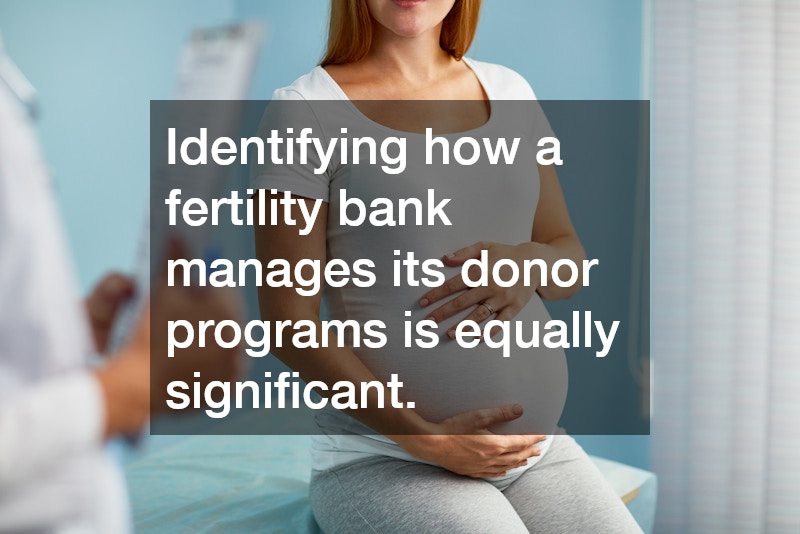Fertility banks play a crucial role for individuals and couples looking to grow their families. Finding a trusted fertility bank is a decision that requires careful consideration and research. In this article, we’ll explore key aspects to consider when choosing a fertility bank.
Understanding the Role of Fertility Banks
Fertility banks serve as essential institutions where individuals can store and retrieve reproductive material, such as sperm, eggs, or embryos, for future use. They provide vital services, especially for those facing fertility challenges or seeking to preserve their fertility for later in life.
Understanding what services are offered and how these align with your needs is an early step in finding a trusted fertility bank. These banks not only assist in fertility preservation but also in assisted reproductive technologies like in vitro fertilization (IVF). Making sense of these services helps to clarify what you should look for in a trustworthy facility.
Identifying how a fertility bank manages its donor programs is equally significant. Some banks provide comprehensive databases with donor profiles, including medical histories and personal characteristics. This transparency helps potential parents make informed decisions that align with their priorities and expectations. Comparing these programs across various banks will aid in determining which bank will best meet your specific needs. Keeping an eye out for banks with strict screening processes for their donors can further assure you of their commitment to safety and quality.
The security and storage conditions within a fertility bank should also be scrutinized closely. Trusted fertility banks adhere to stringent standards to ensure the health and safety of stored materials. Inquire about their facilities’ storage technology and backup systems to better understand how your reproductive material will be protected over time. It is worthwhile to visit the premises or take virtual tours when available to evaluate their operational conditions. Concrete evaluations of these elements contribute significantly to assessing a bank’s credibility and reliability.
Evaluating Fertility Bank Accreditations and Certifications
When seeking a trusted fertility bank, reviewing their accreditations and certifications is essential. Reputable fertility banks often have endorsements from recognized bodies such as the American Association of Tissue Banks (AATB) or the Reproductive Technology Accreditation Committee (RTAC). These certifications indicate adherence to high standards in handling, storing, and processing reproductive materials, ensuring safety and quality. Engaging with a bank that has such accolades provides added reassurance of their commitment to excellence. Ultimately, these endorsements are crucial as they reflect an institution’s dedication to maintaining industry standards.
A fertility bank’s reputation and history in the field should not be overlooked. Long-standing institutions are likely to have a track record of successful outcomes and customer satisfaction. You can gather reliable insights by reading reviews and asking for referrals from healthcare professionals or others who have used the bank’s services. Remember that consistent positive feedback from clients is usually a good indicator of a trusted fertility bank. Checking how frequently they receive updates to their certifications will also convey their commitment to ongoing professional excellence.
Considering the ethical standards a fertility bank adheres to is also of paramount importance. Ethics in donor selection, privacy policies, and the transparent communication about procedures can significantly build trust in a fertility bank. Inquire about their policies and whether they follow the best practices in the field. Transparency regarding the use of genetic materials and the path from donor to recipient can foster confidence in their services. By evaluating their ethical stance, you gain insight into how the institution prioritizes the welfare of its clients and their future families.
Assessing Costs and Financial Policies
The cost of services provided by fertility banks can vary considerably, so understanding their pricing structure is vital. A trusted fertility bank will offer clear, upfront information about costs and any additional fees involved, avoiding unnecessary financial surprises. Comparing prices across different institutions while assessing what is included in these fees can help identify a bank that provides both value and quality. Look for detailed explanations on payment plans and the availability of financial assistance options. Engaging with a fertility bank that caters to your financial situation assures you that your investment is worthwhile.
In addition to straightforward pricing, it’s imperative to comprehend the financial policies in place regarding storage duration and costs. Some banks may offer incentives for long-term storage or discounts for multi-year commitments. Understanding the cost implications over time will help you plan your finances effectively. It’s advisable to ask about policy updates, as periodic changes could affect your budgeting for future fees. Assessing how flexible and transparent these financial policies are can aid in establishing a trusted relationship with the fertility bank.
An essential aspect of assessing fertility bank costs is examining refund policies and guarantees. Not all procedures have guaranteed outcomes, and understanding what happens if expected results aren’t achieved is crucial. Trusted fertility banks often have clear policies about refunds or alternative solutions should procedures not work as anticipated. Discovering their protocols in handling such situations can give you peace of mind when making this significant decision. By scrutinizing these policies, you ensure that you are entering into an agreement that respects your investment and future plans.


